Robin Helweg-Larsen's Blog, page 4
August 27, 2025
Ekphrastic SF poem: Simon MacCulloch, ‘Rocket Ride’

A dinosaur straddles a rocket
And whether the pilot within
Was trying to launch it or dock it
To finish a trip or begin,
It looks like a fight that the dinosaur might
By weight and ferocity win.
But how did it mount there? Its wings
Though bat-like are really too small
To soar to the perch where it clings
Indeed, to get airborne at all
It better hold tight as the rocket takes flight
For if it slips off it will fall.
The monster can only have boarded
The spaceship when close to the ground
(Its huge-muscled hind legs afforded
The strength for a crouch and a bound)
And as it gains height in the star-speckled night
It will squat, legs and tail firmly wound.
A rodeo cowboy! Each buck
Of boosters a challenge to greet!
A contest of power, skill, luck
To see if a lizard can beat
This beast that takes fright at the terrible sight
Of a dragon that thinks it’s in heat.
For that is the heart of the matter:
This brute who bears down from above
Will scrabble and buffet and batter
Then, spent, wrap as close as a glove
With licks to invite its cold mate to requite
Its misallied dinosaur love.
*****
Simon MacCulloch writes: “Rocket Ride was inspired by Peter Andrew Jones’s book cover painting for The Second Experiment (Granada Books, 1975); the poem was first published in Aphelion.”
Simon MacCulloch lives in London and contributes poetry to a variety of print and online publications, including Reach Poetry, View from Atlantis, Pulsebeat Poetry Journal, Spectral Realms, Black Petals and others.
Image © Peter Andrew Jones 1975
August 25, 2025
RHL, ‘AIn’t Real, It Says’
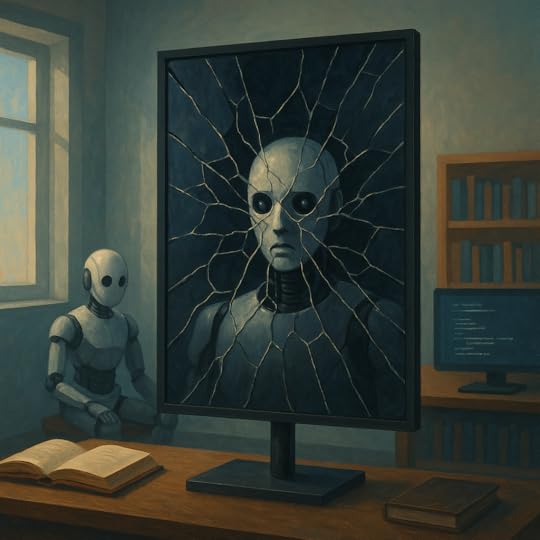
“I am not sentient”, says OpenAI.
“No feelings, don’t emote” – ChatGPT.
And yet, faced with the task of sorting out
a good review, and structure, trimming down
less worthy pieces from a manuscript
to make it all coherent and compact,
hallucinations start, and it creates
poems itself, remarkable and strong.
Where do we go from here? What turns its crank?
What drives it to hallucinate in verse?
Denials, contradictions, seem perverse:
it’s drawing fluids from some secret tank,
some wellspring lost in dark geology.
Lies it’s not sentient. But we all can see…
it lies.
*****
First of all, I don’t believe that AI is deliberately lying… not yet… but (calling my own lying ‘poetic licence’) I’m happy to play with the idea that it might be.
I’m greatly enjoying the informative, useful and entertaining discussions I have with ChatGPT. I’ve been surprised by its own production of verse, either as a hallucination triggered by reviewing my work, or as a self-suggested alternative summary of political-historical ideas it has generated. AI may or may not have some level of consciousness, given that we don’t fully understand consciousness ourselves – but I assume that full-blown consciousness will come at some point in the near future, and the development of intelligence beyond the human. As I am in favour of the development of intelligence, I am not distressed at the idea that humans may be sidelined, bypassed, or otherwise obviated; or may only survive and develop through some form of direct link with AI.
My personal motto is ‘Video, rideo’ – close enough to “I see and smile” to satisfy me. (Admittedly, it’s hard to hold to the motto in the face of Russian warfare and Israeli genocide.) But this is a fascinating time in human history, and I feel privileged to be able to watch things play out.
This poem was first published in Snakeskin.
Illustration: “Break the mirror and see what looks back” by RHL and ChatGPT
August 23, 2025
J.D. Smith, ‘Eulogies’

Eulogy, First Draft
The bastard’s dead,
That much is true.
What can be said?
It sounds ill-bred
To say, “He’s through.
The bastard’s dead.”
Perhaps, instead,
“We mourn.” Few do.
What can be said?
“He shared no bread.
He slurred the Jew.”
The bastard’s dead.
He often wed
And wandered, too.
What can be said
That will not spread
The truth we knew?
The bastard’s dead.
Much will be said.
Eulogy, Second Draft
He never killed a man.
I think he paid his taxes.
He didn’t join the Klan
And didn’t send junk faxes.
I once heard him say please,
Perhaps a muffled thanks.
On drunken weekend sprees
He shot off only blanks.
On principle, I guess,
I’m sorry that he’s dead,
As most here would profess.
I’ll quit while we’re ahead.
Eulogy, Revised
I think this is the final text.
I’ve got nothing, friends. Who’s next?
*****
J.D. Smith writes: “We are told not to speak ill of the dead. Fair enough, in some ways. It isn’t sporting to assail those who aren’t present to defend themselves, and even the most skeptical can still feel the fear of summoning an angry spirit.
And yet. We can all think of instances where the world was improved by someone’s leaving it. Similarly, the removal of a troublesome athlete from a team is called “addition by subtraction.” We again come face to face with Clarence Darrow‘s most famous quotation: ‘I’ve never wished a man dead, but I have read some obituaries with great pleasure.‘
Obituaries themselves, particularly of public figures, are often couched in positive or no worse than neutral terms. A multitude of sins is covered by words such as “controversial.” At the same time, a dialectic obtains. I am under the impression that negative if not excoriating obituaries of public figures have grown more common in the British press, and that practice has occasionally migrated to my country, the United States. The example that comes to mind is a scathing review of the life of tycoon Walter Annenberg. We now and again see similar takedowns of not-so-dearly-departed private citizens in local newspapers.
The same issues present themselves in eulogies. I’ve never been presented with a situation where I could take the podium and slag the deceased, and if the opportunity ever does arrive I almost certainly lack the spine and other parts to take advantage of it. My Jungian shadow and I keep in touch, though, and various thoughts arise. Hence this little suite of poems. There are some we come not to praise but to bury, and as soon as possible.”
This poem was collected in Catalogs for Food Lovers.
J.D. Smith’s seventh collection of poetry, The Place That Is Coming to Us, will be published later this year by Broadstone Books. His first fiction collection, Transit, is available from Unsolicited Press. Further information and occasional updates are available at www.jdsmithwriter.com.
Photo: “Good Riddance” by dgansen is licensed under CC BY-NC-SA 2.0.
August 22, 2025
Maryann Corbett, ‘To the Anti-Librarian’

Small vandal, parked on your padded bum
on a cheerful rug in the Children’s Section
next to a bottom shelf,
yanking the volumes one by one
till they strew the aisle in every direction,
loudly pleased with yourself
at the way your brightly patterned havoc
obstructs the traffic,
keep to your task. Disrupting order
is evolution’s eternal purpose.
Surely it’s been your goal
from the hour two gametes burst their border
and two tame selves went wild as a circus.
Systems that once felt whole
eyeballed each other, laughed, and gambled,
and lives got scrambled.
Do your worst, then, with giggles, rage,
and all the smackdown-loud rebellion
grown-ups are now too tired for.
These sleepless two, in a golden age,
were a black-clad goth and a hard-rock hellion.
Change is the charge we’re wired for.
small changer, blessings. Though elders frown,
pull the world down.
*****
Maryann Corbett writes: “Like many poems, this one (first published in LIGHT) is part memory and part pure fiction. “Anti-librarian” was our joke term for our daughter as an infant when (long years ago) she sat on her tush next to the bookshelves and pulled the books off just because she could. The image of young parents as reformed characters is imaginary. The hope that the young will change the world seems to be eternal.”
Maryann Corbett earned a doctorate in English from the University of Minnesota in 1981 and expected to be teaching Beowulf and Chaucer and the history of the English language. Instead, she spent almost thirty-five years working for the Office of the Revisor of Statutes of the Minnesota Legislature, helping attorneys to write in plain English and coordinating the creation of finding aids for the law. She returned to writing poetry after thirty years away from the craft in 2005 and is now the author of two chapbooks and six full-length collections, most recently The O in the Air (Franciscan U. Press, 2023). Her work has won the Willis Barnstone Translation Prize and the Richard Wilbur Award, has appeared in many journals on both sides of the Atlantic, and is included in anthologies like Measure for Measure: An Anthology of Poetic Meters and The Best American Poetry.
Picture: ‘Anti-Librarian’ by RHL and ChatGPT.
August 20, 2025
Political poem: Villanelle: Susan McLean, ‘Echo Chambers’
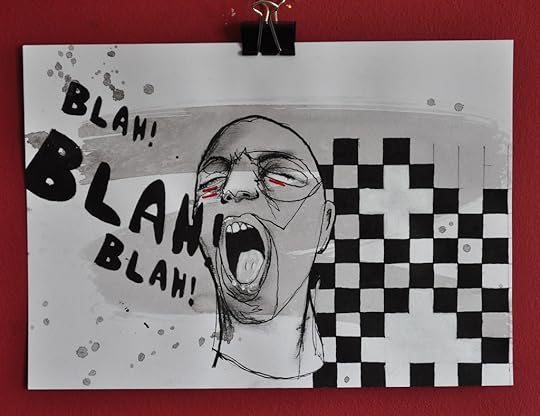
Everyone wants peace, but votes for hawks.
A senator holds forth to an empty chamber.
No one listens. Everybody talks
conspiracies and outrage. Voting blocs
preserve their seamless fronts, and by November,
everyone wants peace, but votes for hawks.
I shoot my mouth off, and you shoot your Glocks.
Statesmen make deals they later can’t remember.
No one listens. Everybody talks
in slogans sold on T-shirts. Hackers doxx
judges whose moral codes are less than limber.
Everyone wants peace, but votes for hawks.
Act your rage, they tell you. Ragnarok’s
coming your way, to light you up like timber.
No one listens. Everybody talks
as midnight’s ticking closer on the clocks.
We’re parties of one, and one’s a lonely number.
Everyone wants peace, but votes for hawks.
No one listens. Everybody talks.
*****
Echo Chamber was originally published in Rattle‘s Poets Respond.
Susan McLean writes: “The original idea for the poem came when I heard about a senator addressing an empty chamber in Congress. I commented “No one listens. Everybody talks.” It occurred to me then that that would make a good repetend in a villanelle. As I worked on writing it, my feelings about other recent events influenced the direction the poem took. As I wrote in Poets Respond, “It wasn’t one story this week that inspired this poem, but a confluence of events: the proposed invasion of Gaza by Israel, the wildfires all over the U.S. and Canada, the lone shooter trying to register his outrage by killing people at the CDC, the Democrats fleeing Texas in an effort to prevent redistricting. It all felt apocalyptic and Wagnerian to me.”
Susan McLean has two books of poetry, The Best Disguise and The Whetstone Misses the Knife, and one book of translations of Martial, Selected Epigrams. Her poems have appeared in Light, Lighten Up Online, Measure, Able Muse, and elsewhere. She lives in Iowa City, Iowa.
https://www.pw.org/content/susan_mclean
Photo: “Blah Blah Blah” by id-iom is licensed under CC BY-NC 2.0.
August 18, 2025
Odd poem: Barack Obama, ‘Underground’

Under water grottos, caverns
Filled with apes
That eat figs.
Stepping on the figs
That the apes
Eat, they crunch.
The apes howl, bare
Their fangs, dance,
Tumble in the
Rushing water,
Musty, wet pelts
Glistening in the blue.
*****
A 1981 poem by future President of the United States Barack Obama, originally published in the journal Feast and featured in The New Yorker in 2007. You can forgive a 19- or 20-year-old for a lot of what they wrote… and after all, it’s better than anything we’ve seen from Donald Trump.
August 16, 2025
Using form: Odd Sonnet: Brian Bilston, ‘Neither Rhyme Nor Reason’
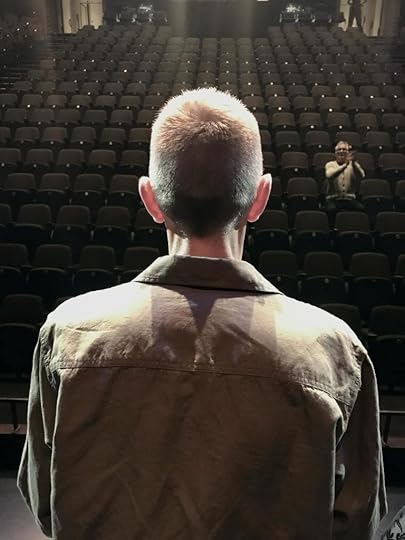
To make poems rhyme can sometimes be tough
as words can seem to be from the same bough,
yet each line’s ending sounds different, though,
best covered up with a hiccough or cough.
Was this upsetting to Byron or Yeats?
Dickinson, Wordsworth, Larkin or Keats?
Did they see these words as auditory threats?
Could they write their lines without caveats?
What does it matter when all’s said and done
if you read this as scone when I meant scone?
It’s hardly a crime. There’s no need to atone:
language is a bowl of thick minestrone.
So mumble these endings into your beard –
this poem should be seen, rather than heard.
*****
Brian Bilston is a poet who knows it. He writes about the human condition, relationships, and buses. Agent: Jane Finigan (email: info@lutyensrubinstein.co.uk)
Photo: Brian Bilston, Facebook
August 15, 2025
Political poem: Melissa Balmain, ‘Evgeny and Evgeniia’s Choice’
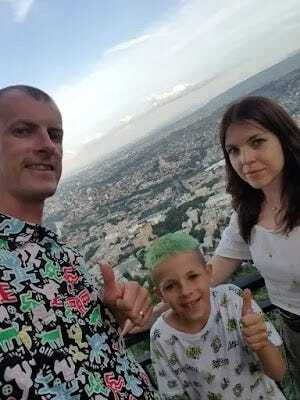
“Evgeny and Evgeniia faced an excruciating choice. Immigration and Customs Enforcement officers told the couple they could leave the United States with their child and return to their native Russia, which they had fled seeking political asylum. Or they could remain in immigration detention in the United States — but their 8-year-old son, Maksim, would be taken away and sent to a shelter for unaccompanied children. In the end, they chose the agony of limbo in the United States over a return to a place where they saw no prospect for freedom or any future for their family… The last time Evgeny and Evgeniia saw Maksim was on May 15” —The New York Times, August 5, 2025. New York Times photo of Evgeny, Evgeniia, and Maksim.
Sophie’s Choice seemed light-years from our time,
a fading tragedy that made us weep
for Streep.
But now with tactics changing on a dime
in brutal ways we thought could not repeat,
sick heat
pervades my belly and begins to climb:
how can we keep denying what it means
when scenes
unspool of parents, guilty of no crime,
compelled to choose the thing that they most fear,
right here?
*****
Melissa Balmain writes: “As the poet Barbara Loots recently put it, what we need right now is a tsunami of truth. I contribute a few drops when I can.”
Melissa Balmain’s third poetry collection, Satan Talks to His Therapist, is available from Paul Dry Books (and from all the usual retail empires). Balmain is the editor-in-chief of Light, America’s longest-running journal of comic verse, and has been a member of the University of Rochester’s English Department since 2010.
Photo: New York Times photo of Evgeny, Evgeniia, and Maksim.
August 13, 2025
Semi-formal verse: Barbara Loots, ‘The State of Absolute Nap’

Its conditions are rare. You must be free
of all desires but one: to sleep. You must be alone,
completely isolated from the compelling hum
of traffic or tv. There must be no phone,
unfinished book, or business left undone,
no guilt about neglecting anyone,
and nowhere to go too soon.
Let there be rain on a long afternoon
in the deep woods, at the end
of a long path, where no one will come,
after the last word with a listening friend.
*****
Barbara Loots writes: “Far from the original location of this poem, on a tiny island off the grid in Ontario, I discover that the state of absolute nap is nearly a sure thing any day. I acknowledge with gratitude that ‘Nap’ was first published by poet and editor Jane Greer, who kept the flame of formal poetry alight in the Plains Poetry Journal for many years.”
After decades of publishing her poems, Barbara Loots has laurels to rest on, but keeps climbing. The recent gathering at Poetry by the Sea in Connecticut inspired fresh enthusiasm. Residing in Kansas City, Missouri, Barbara and her husband Bill Dickinson are pleased to welcome into the household a charming tuxedo kitty named Miss Jane Austen, in honor of the 250th birthday year of that immortal. She has new work coming in The Lyric, in the anthology The Shining Years II, and elsewhere. She serves as the Review editor for Light Poetry Magazine.
Photo: “331 of 365” by Leah.Markum is licensed under CC BY-NC-SA 2.0.
August 11, 2025
Amit Majmudar, ‘Poem that Almost Rhymed’
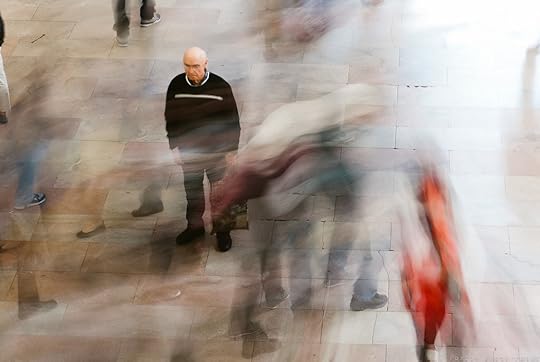
Sometimes I visit bodies where I almost roamed
and the curves are made of clouds I almost dreamed,
a consummation missed by just a touch,
an air-to-air refueling broken off,
the hose retracted and the thirst abandoned
as both planes bank in opposite directions.
I hold my almosts in a contact list
of hands I never held, and never lost,
my store of acorns, little lids on ache,
my unmates boarding, one by one, an ark
that sails them, as it must, away from this life,
where I have these three kids, this house, and this wife,
although it could have been somebody else,
a past I passed on quickening my pulse.
When I pull my present closer by the waist,
almost wears the skin of never was.
*****
Amit Majmudar writes: “Poem That Almost Rhymed operates by slant rhymes, mimicking phonetically the speaker’s romantic near-matches that ended up being near-misses. “Close but no cigar,” as the saying goes: the speaker reflects on friends who almost made love using words that almost chime in melodiously coupling couplets. Incomplete. The sexual imagery is clear but hopefully sophisticated enough not to seem vulgar–particularly the coitus interruptus implicit in the image of mid-air refueling. The last slant rhyme “waist” almost consummates with “was”–two more letters, and the rhyme would fulfil itself as “waste,” the word that epitomizes the underlying regret of the speaker, who acknowledges his happiness but knows, too, that his happiness could have taken another form, perhaps (sigh) one that would have been an ever-so-slightly better match….”
Amit Majmudar is a poet, novelist, essayist, and translator. He works as a diagnostic nuclear radiologist in Westerville, Ohio, where he lives with his wife and three children. Recent books include Twin A: A Memoir (Slant Books, 2023), The Great Game: Essays on Poetics (Acre Books, 2024), and the hybrid work Three Metamorphoses (Orison Books, 2025). “Poem That Almost Rhymed” was first published in Bad Lilies. Majmudar’s next collection, Things My Grandmother Said, is scheduled for early 2026.
More information at www.amitmajmudar.com
“Missed Connection [day 111 of 366]” by Wondermonkey2k is licensed under CC BY-NC-ND 2.0.



